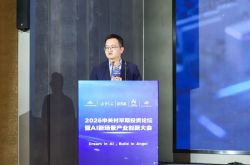Global Premiere of AI Digital Employees Marks the Dawn of Large-Scale Adoption
![]() 08/06 2025
08/06 2025
![]() 481
481

The era of AI digital employees has officially begun, transitioning from their initial debut to widespread implementation.
This year, Baidu Intelligent Cloud's telemarketing department welcomed a novel addition to its team – an AI digital employee. This digital employee is tasked with calling customers who have left inquiries on Baidu Intelligent Cloud's official website, swiftly identifying high-intent customers, and then transferring them to human telemarketers for further engagement. Tasks that previously required tens of thousands of calls can now be accomplished with just dozens to hundreds, dramatically enhancing both efficiency and conversion rates.
Previously, these inquiry calls were solely handled by human agents, making it challenging to manage call timings and leading to a significant number of unconnected calls. Today, with digital employees working alongside humans, the entire workflow has achieved remarkable results.
The emergence of digital employees has swiftly garnered attention within the industry. Within just 15 days of their launch, the number of visits to Baidu Intelligent Cloud's Keyue official website increased by 70%, and the number of leads doubled. These digital employees have been implemented across multiple industries, such as a large insurance group utilizing them for short-term insurance marketing, which nearly doubled the intent rate.
On August 5, at Baidu AI Day, Baidu Intelligent Cloud officially unveiled the world's first batch of AI digital employees, spanning seven core business functions: marketing manager, repayment assistant, car sales, promotion specialist, product manager, course consultant, and recruitment specialist.
Their appearance is a personified interactive image, but at their core, they are business agents built on large models. These agents can be directly embedded into enterprise business processes to complete tasks and deliver results, truly achieving "understanding business, delivering results, and evolving." With the maturation of large models, agent technology, and the proliferation of digital humans, digital employees are transitioning from conceptual experiments to large-scale commercial deployment.
01
Digital Employees Reach a Turning Point
Currently, many enterprises' digital humans are undergoing a new round of upgrades, transforming directly into digital employees capable of delivering tangible results. This shift is particularly evident in the financial industry. Previously, many banks and securities institutions had already introduced digital humans dressed in corporate uniforms, responsible for introducing products and guiding customers through processes. Nowadays, these customized "digital employees," including smart customer service and investment advisors, have fully integrated into financial institutions' online and offline service and marketing processes.
This upgrade is not coincidental. Shi Zheng, the head of Baidu Intelligent Cloud's intelligent marketing business, discovered during interactions with enterprises that initially, their demands were relatively simple, mostly wanting a digital human image that could speak and move, exuding a sense of technology and capable of basic interactions, akin to a "virtual greeter." Nowadays, driven by large models, especially the enhancement of Agent capabilities, customers hope that digital humans can not only speak but also act.
"Overall, there is a trend among customers evolving from wanting just a tool or image to desiring tangible results," said Shi Zheng.
In fact, the concept of "digital employees" dates back to 2015, with the turning point emerging in the past two years.
The world model, grounded in multimodal large models, already possesses abilities such as physical world modeling, causal reasoning, counterfactual deduction, and long-term planning. This enables AI to leap from the Copilot form of human-computer collaboration to an Agent with autonomous execution capabilities, ushering in the Agentic era dominated by AI. Furthermore, the reasoning cost of large models has decreased by nearly 60 times within a year, further accelerating the cyclical evolution of the market.
"More and more Agents will participate in various aspects of enterprise operations in the form of 'digital employees,'" said Ruan Yu, Vice President of Baidu. "As production units, digital employees are revolutionizing organizational productivity."
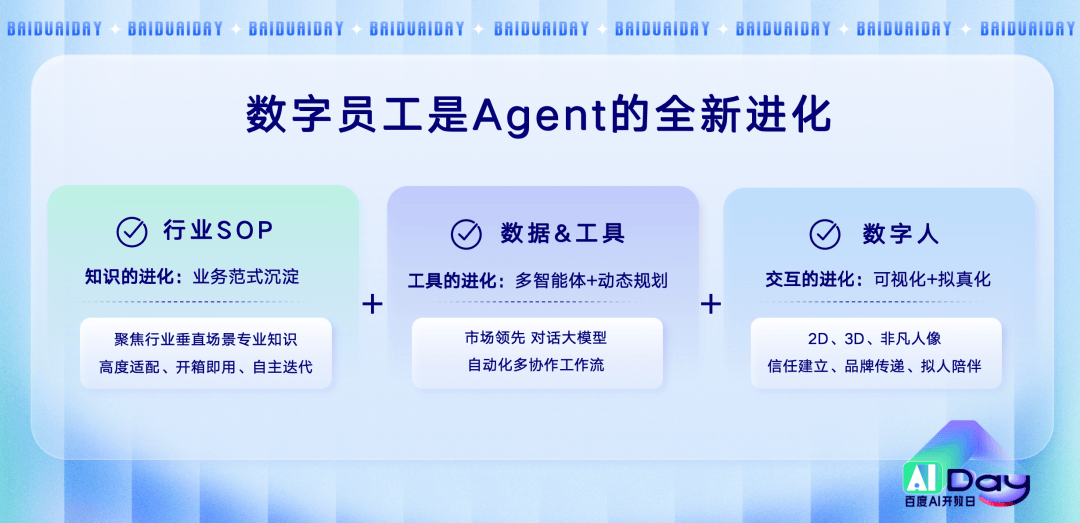
In Shi Zheng's view, in the To B sector, many Agents will eventually evolve into digital employees, embedding themselves into business processes in a "more concrete and business-savvy" manner and being held accountable for results. Moreover, they are not a replacement for humans but rather a collaborative partner.
In essence, digital humans focus on the enterprise's "virtual storefront" and are responsible for being remembered; digital employees, on the other hand, focus on "business delivery" and directly create value. They integrate personified interfaces with business agents, achieving a 1+1>2 effect.
In Baidu Intelligent Cloud's practice, digital employees are being rolled out across various industries.
In the automotive industry, they demonstrate their prowess in high-ticket, professional sales. For instance, in an automobile 4S store, the "car telemarketing" digital employee proactively makes calls after customers visit the official website. When customers inquire about the parameters and comparative advantages of three models, the "car telemarketing" agent not only discerns their real purchasing needs but also provides precise recommendations based on model configurations and preferential policies, directly inviting customers for a test drive. The professionalism and response speed of the entire process rival that of human sales consultants.
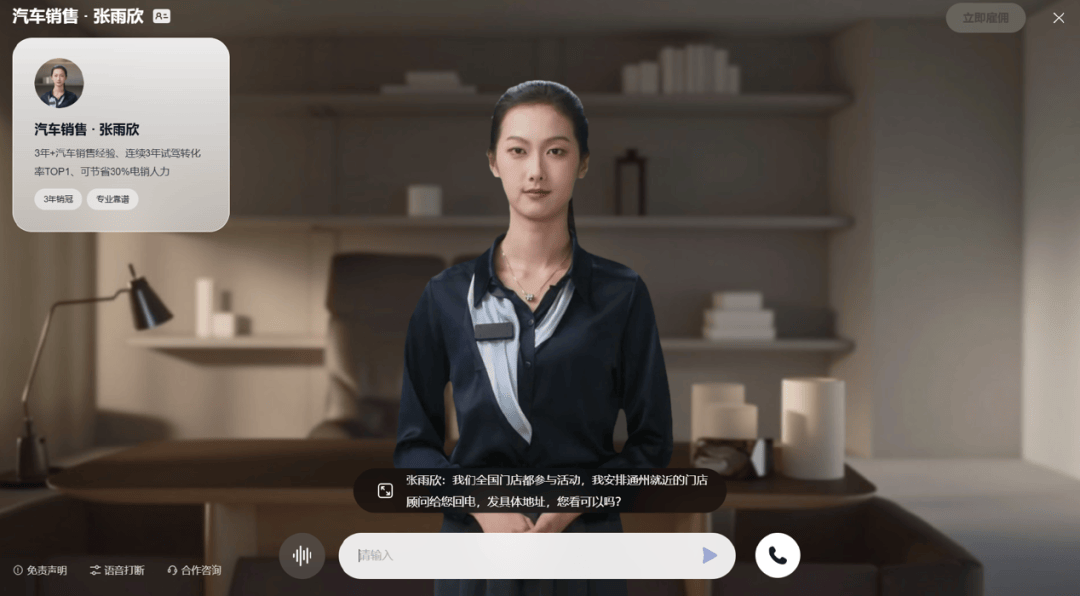
In the education and training industry, after the course consultant "took the job," it took over all aspects, from initial enrollment consultations and service follow-ups to later renewals. It doesn't miss any parent inquiries and answers them online in real time; through intelligent algorithms, it scales screening and hierarchical cleaning, reactivating those long-silent leads; and at the renewal conversion stage, it can extract historical conversation memories and automatically trigger follow-up reminders. The "course consultant" significantly improves institutional operational efficiency, allowing educational consultants to focus on high-value conversions, with overall employee efficiency increased by 40%.
Although the concept of digital employees has been tried out in the past few years, it is only today, with the proliferation of digital human technology, the leap in large model capabilities, and the widespread adoption of Agents, that digital employees have truly reached the turning point for large-scale implementation.
02
Where Do the First Seven Digital Employees Realize Value Loops First
In which industry scenarios can digital employees first realize value loops?
A simple principle applies: where there are cost pressures and service gaps, there is an entry point. Over the past few years, digital humans, large models, and Agent technology have all taken the lead in marketing and service scenarios. Relevant reports show that the scale of China's AI Agent marketing and sales market will reach approximately 44.2 billion yuan in 2024, with the potential to exceed one trillion yuan in the next five years.
Digital employees will be no exception. Shi Zheng told Digital Frontline that digital employees in service and marketing scenarios naturally have the advantages of "measurable value and high-efficiency closed loops."
Therefore, the first batch of digital employees are almost entirely developed around these high-value scenarios – marketing manager, repayment assistant, car sales, promotion specialist, product manager, course consultant, and recruitment specialist. Users can directly experience them by searching for "Baidu Digital Employees" on Baidu or directly entering Baidu Intelligent Cloud's official website and navigating to the Baidu Intelligent Cloud Keyue section.
How effective are they? We gave it a try. It is evident that the digital employees respond swiftly, generally understanding questions and promptly responding whether through text or voice communication, and can seamlessly switch topics at any time. If the user remains inactive for 2 minutes, the digital employee kindly reminds them and actively hangs up to avoid ineffective waiting.

When conversing with the "car sales" agent, it not only accurately answers questions about model configurations and prices but also proactively offers to help contact nearby store consultants and push detailed addresses when we inquire about nearby stores.
In a conversation with the "recruitment specialist," the digital employee continuously guides applicants to understand job information and introduce their work experience. For qualified applicants, the digital employee will also inquire if they can add WeChat, and upon receiving a positive response, will further indicate that an enterprise WeChat QR code will be sent via SMS, ready to be scanned.
Shi Zheng summarized that a qualified digital employee should possess three characteristics: "understanding business, delivering results, and evolving." Zhang Hongguang, Deputy General Manager of Baidu Intelligent Cloud's intelligent marketing products, interpreted the technical capabilities behind them:
Based on these capabilities, digital employees have taken the lead in starting work within Baidu's internal business.
Since the launch of the Netizen Rights Protection Plan in 2013, Baidu's Protection Team's customer service has served thousands of users daily, involving multiple links such as online communication, case analysis, behavior mediation, and phone follow-ups, with both a large number of standardized processes and high-level professional judgment requirements. Additionally, the customer service industry generally faces difficulties in talent development – new customer service representatives require weeks to months of training to handle complex business, presenting obvious efficiency bottlenecks.
The introduction of digital employees has brought about qualitative changes. They can provide stable services 24/7, accurately identify user intentions and emotions, complete personified follow-ups, and feed analysis results back into business optimization. Data shows that after introducing digital employees, service efficiency has increased by 18 hours and the success rate of user application for protection has increased by 60%.
For external enterprises, Shi Zheng revealed that Baidu currently provides four digital employee service models tailored to the needs of different enterprises: SaaS subscription, hybrid cloud/privatization, customized services, and RaaS pay-for-performance.
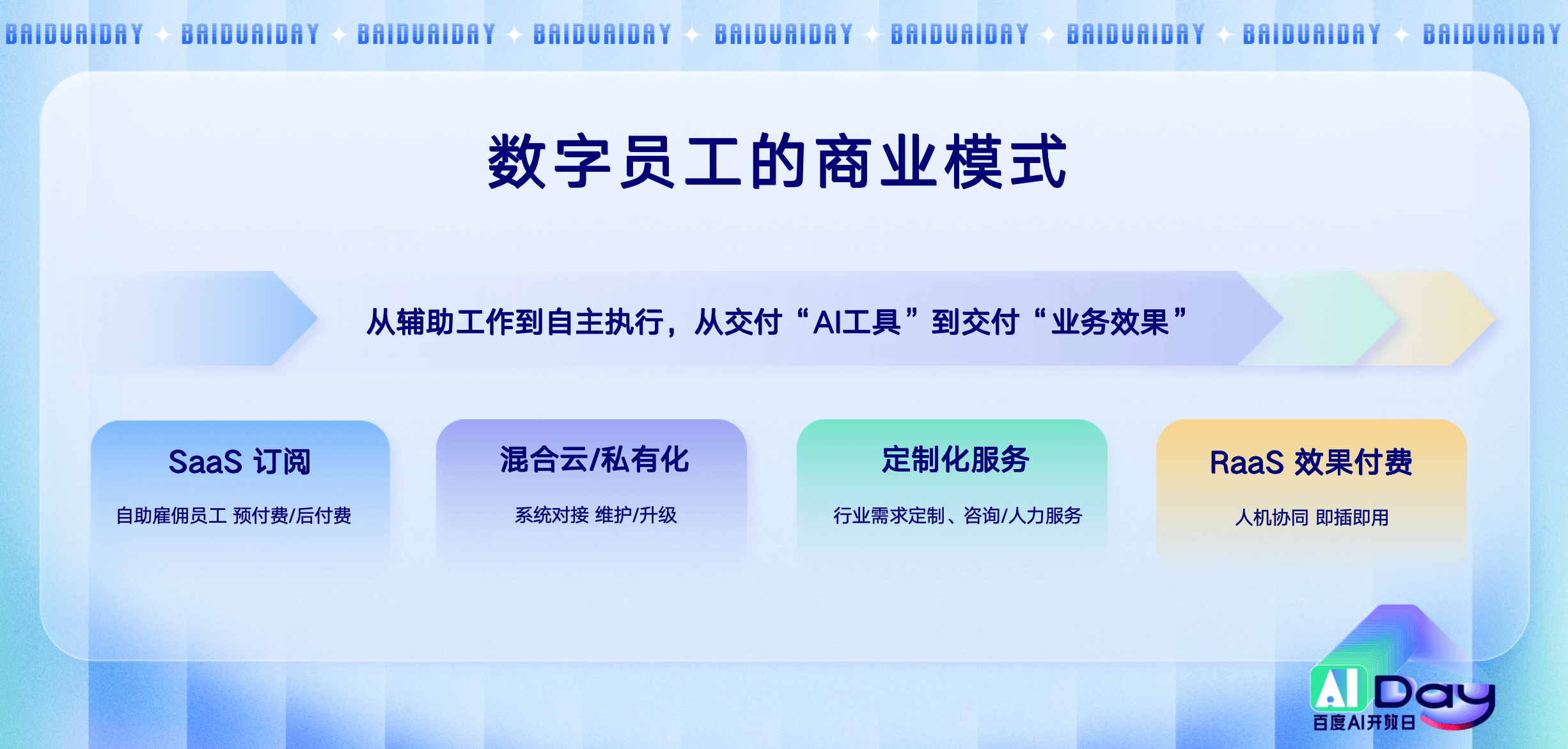
For instance, the SaaS subscription model is suitable for mid-to-long-tail enterprises. Enterprises only need to log in to the Baidu platform, select their preferred image, pair it with a preset template, add personalized configurations, make simple adjustments, and go live, which can be deployed to enterprise official websites, mini-programs, apps, enterprise WeChat, and other channels.
Customized services are aimed at top customers with advanced needs. Baidu will provide one-on-one companion services, offering in-depth customization services such as image customization, knowledge base construction, business flow and permission integration.
RaaS pay-for-performance is a trending model this year, with customers increasingly focused on results and willing to pay for them, based on revenue growth and cost reduction, with payments made according to a commission ratio. Hybrid cloud/privatization is suitable for customers who need to balance flexibility and security, with complex and diverse business scenarios.
Shi Zheng told Digital Frontline that Baidu Intelligent Cloud will focus on expanding digital employee scenarios in the education, automotive, financial, and fast-moving consumer goods industries this year, jointly creating typical models with top customers such as college enrollment consultants, 4S store sales specialists, and bank marketing specialists. The entry threshold for enterprises is as low as ten thousand yuan, providing more industries with low-threshold, highly adaptable intelligent solutions.
03
Why Launch Digital Employees at This Moment
Digital employees are at an unprecedented critical juncture.
At the "core" Agent level, 2025 is recognized by the industry as the first year of Agent commercial explosion. Over the past few years, Agents have remained in the conceptual validation stage but are now accelerating into large-scale implementation. A PwC survey shows that 79% of medium-to-large enterprises and public institutions have integrated Agents into their workflow, with the six major industries of finance, healthcare, retail, manufacturing, customer service, and software development leading the way in achieving large-scale applications.
In terms of breadth, McKinsey's survey shows that only 15% of enterprises deployed Agents in 2024, while this proportion has jumped to over 60% in 2025. More than 70% of CEOs believe that Agents will significantly change enterprise business models within three years.
In terms of depth, Agent applications are evolving from single tasks to cross-process, multi-Agent collaboration, taking enterprises' digitization to a new stage.
Digital employees are built on this Agent foundation, achieving "understanding business, delivering results, and evolving."
At the "shell" digital human level, the proliferation of technology is also accelerating. In the past, the production of digital humans relied on motion capture equipment and professional teams, with high costs; nowadays, AI self-generation technology has significantly reduced production and operation thresholds. By simply uploading a photo and recording a voice, an interactive virtual image can be generated, and digital humans have moved from "high-end customization" to "popular application," entering larger-scale industry deployment.
Industry data reveals that the 24-hour live streaming cost of virtual anchors, leveraging digital humans, is already less than one-tenth of that incurred by real anchors. In a notable case by Baidu Intelligent Cloud, a catering enterprise employed digital humans for a 6-hour live stream at merely 15% of the cost associated with real anchors, yet achieved 85% of the sales effectiveness. In the education sector, a pioneering institution utilized digital humans for course recording, resulting in a one-third reduction in production costs and a 20-fold increase in recording efficiency.
Regarding language interaction, Baidu has pioneered a cross-modal speech-language large model grounded in Cross-attention technology, delivering a seamless, human-like interactive experience with minimal delay, natural interruptions, and fluid dialogue. This model integrates advanced technologies such as speech recognition, large language models, and speech synthesis, enabling digital employees to comprehend and respond in an exceptionally short timeframe. With a speech recognition accuracy rate of 98% and dialogue delay reduced to under 1 second, these digital employees output the most appropriate emotions and feedback based on the text.
Given their interactive capabilities, business functionalities, and cost efficiency, digital employees are poised to swiftly traverse the commercial lifecycle and achieve profitability.
The synergy of business functionalities, interactive capabilities, and cost advantages positions digital employees to effortlessly navigate the commercial lifecycle.
According to relevant personnel from Baidu Intelligent Cloud, digital employees exhibit natural advantages, particularly in marketing and service scenarios. Firstly, their value is quantifiable; deeply embedded in the entire transaction chain, their contributions can be directly linked to metrics like GMV, inquiry conversion rates, and customer order value, offering a transparent and visible ROI. Secondly, they facilitate highly efficient closed loops; digital employees can establish an "interaction-insight-optimization" cycle, becoming increasingly precise with use. For instance, consultation and marketing feedback further enrich user personas and refine strategies, continuously enhancing conversion rates.
An IDC report released in June 2025 highlights that in China's AI digital human market in 2024, Baidu secured the top spot with a market share of 68.8%. Leveraging a decade of experience in intelligent customer service dialogue with "Keyue" and seven years of technical expertise in "Xiling" digital humans, Baidu Intelligent Cloud integrates large model Agent architecture with industry know-how to create the nation's first batch of AI digital employees. This innovation marks a qualitative leap from function execution to business decision-making and result delivery.
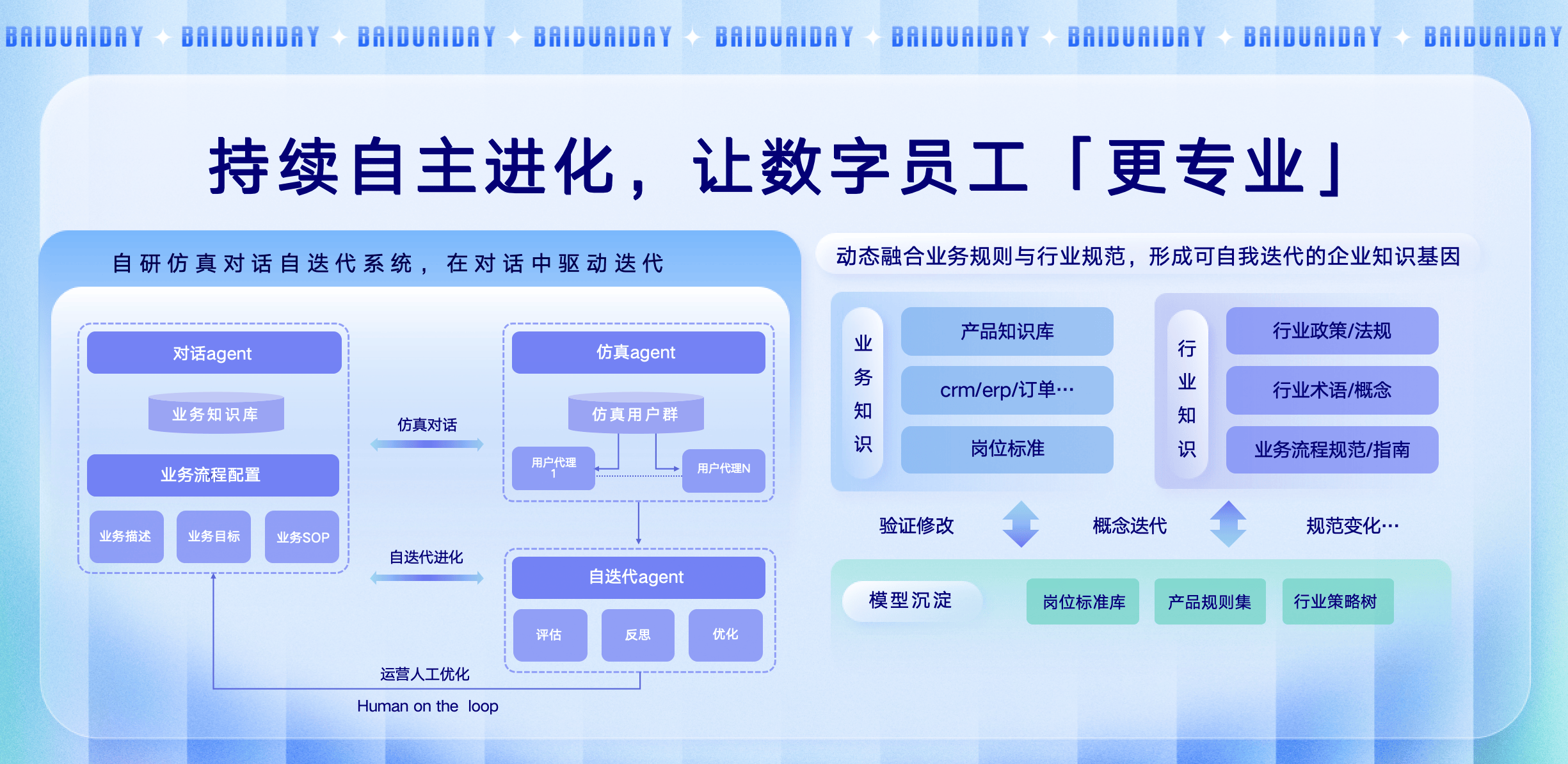
Looking ahead, while current implementations primarily focus on standardized services, digital employees will extend their reach into non-standard scenarios in tandem with industry SOPs. This includes lead mining and marketing plan formulation, unlocking complex decision-making capabilities. The human-machine collaboration model will redefine organizational structures, with digital employees handling routine operations like product consultants addressing 80% of high-frequency inquiries, while human employees concentrate on high-value creative decision-making and business analysis.
In the future, digital employees will not only excel in standardized services but also venture into non-standard business scenarios, such as lead generation and marketing strategy planning, through industry SOPs. This will unlock their complex decision-making capabilities. Moreover, human-machine collaboration will reshape the organizational division of labor, with digital employees managing product consultations and 80% of high-frequency inquiries, while human staff focus on high-value creative decision-making and business analysis.
It is foreseeable that as the capabilities of agents converge with the interaction of digital humans, digital employees will emerge as the "growth engine" for enterprises. 2025 heralds the inaugural year of collective adoption and comprehensive expansion for digital employees.


